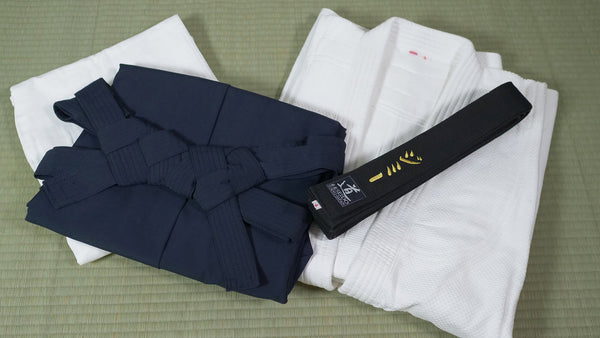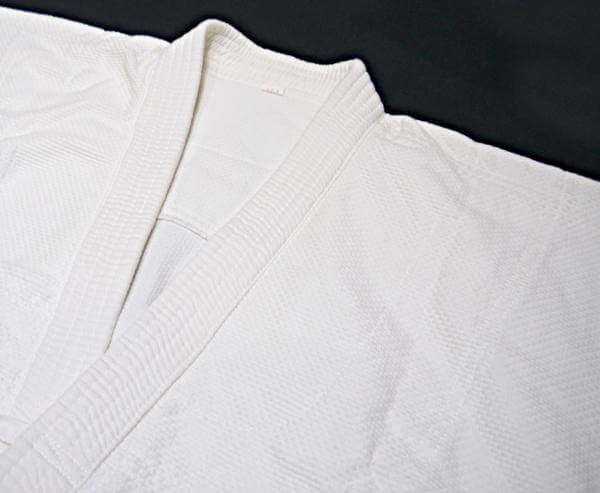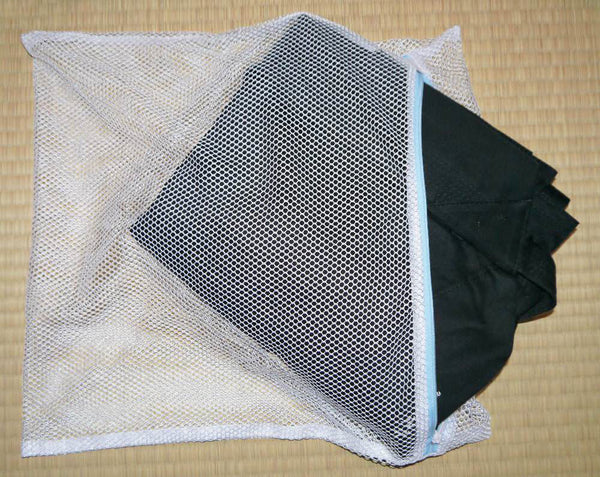Looking after your Hakama, Dogi (Kimono) & Obi (belt)
Washing, ironing, folding and drying
Here is all the information you need to look after your Dogi, polyester or cotton Hakama, and Obi. By following these tips, you will greatly extend the lifespan of your equipment. We also uploaded a video showing in details how to fold your Hakama.

Aikidoka’s classic outfit... to be properly maintained!
Looking after your equipment is a matter of Etiquette (Hakama, Dogi), safety (weapons, protective gears) and hygiene. Your partners will be thankful and will engage you confidently if you practice with clean and well maintained equipment.
Dogi (kimono)

A Dogi from Seido after 3 years of use
Whether your Dogi is a pre-shrunk model or not, the tips for washing it are the same. Please remember that cotton shrinks (slightly) even in cold water. Japanese manufacturers usually indicate on their products a "shrinkage rate", but this is not always the case abroad however. At SeidoShop.com, Dogi’s shrinkage rates are specified on the product sheets. Pre-shrunk Dogi are prepared in cold water and therefore can still shrink a little when washed with hot water. We recommend washing your Dogi after each practice. By the way, in Japan, most washing machines only operate with cold water! That’s why manufacturers do not generally indicate any washing temperatures.
Abroad, a cold wash means 30 °C maximum. It is possible to wash at 45 °C without significantly increasing the shrinkage of the cotton, and without damaging the Dogi, but 45°C is the limit. Never setup your machine above 45 ° C!!!
Cold wash will keep your Dogi in good condition, longer. Do not bring an indigo dyed Dogi (Kendogi) to the dry cleaner’s, unless you are sure he knows how to handle this kind of apparel.
Washing a classic bleached cotton Dogi
- First wash: cold wash without detergent - Can be washed with other clothes.
- Regular washes: at 45 ° C maximum. For best results, we recommend stopping your machine once filled with water and detergent, and letting the Dogi soak for about 30 minutes before completing the full cycle.
- Avoid bleach as much as possible. Bleach makes logos and embroideries fade, and damages cotton ultimately. However, if your Dogi does need to be whitened, do not pour bleach directly onto the fabric; mix it with the water of the washing machine and stir properly.
- Dry Dogi on a wire or hangers immediately after washing. Never use a tumble-dryer! Also avoid drying under direct sunlight.
- Ironing must be done with a low-power iron.
Note that a slight bluish tinge may appear on some high quality Dogi. This is normal; the tinge will disappear after a few washes. That colour appears only on very high quality fabric.
Washing a Dogi dyed with natural indigo (Aizome)
- First wash: cold wash without detergent. Soak for a few hours and repeat the operation 4 to 6 times. (It is possible, and recommended, to add white vinegar and / or salt to the water as fixatives).
- Regular washes: at 30°C maximum (washing machine not recommended). Never wash with other clothes as natural indigo strongly runs, even after numerous washes. Never use bleach.
- Dry on a wire or a hanger immediately after washing. Never use a tumble-dryer! Also, avoid drying under direct sunlight.
Cotton Dogi dyed with natural indigo tend to fade over the years, regardless of how you upkeep it.
It is possible to purchase bottles of Indigo dye in order to give back to your Dogi (and Kendo armour) its original hue.
Folding a Dogi
If you use your Dogi frequently, you can just hang it after every practice. However, if you need to store your Dogi for a long period of time, we recommend that you fold it, following the seams. Once folded, wrap it in a cloth or a polyester bag to prevent it from turning yellow.

Cotton Hakama in a washing net.
Hakama
Cleaning a Polyester Hakama
- First wash: cold wash without detergent, by hand. If you really need to use a washing machine, fold your Hakama and place it into a laundry net or a tied piece of fabric to prevent the Hakama from losing its pleats.
- Regular washes: at 45°C maximum. Polyester hakama and blackened cotton Hakama do not fade, so it is possible to wash them with other clothes. We however advise you to soak your Hakama in a sink or bath tub with detergent for one hour rather than using a machine.
- Dry on a wire or a hanger immediately after washing. Never use a tumble-dryer! Also, avoid drying under direct sunlight. Make sure to redo the pleats before drying, and, if possible, hold them with clothes pegs.
Cleaning a Hakama dyed with natural indigo
- First wash: cold wash without detergent, by hand. Soak for a few hours and repeat the operation 4 to 6 times. (It is possible, and recommended, to add white vinegar and / or salt to the water as fixatives).
- Regular washes: at 30°C maximum. - Never wash with other clothes as natural indigo strongly runs, even after numerous washes. Never use bleach.
- Dry on a wire or hanger immediately after washing. Never use a tumble-dryer! Also, avoid drying under direct sunlight. Make sure to redo the pleats before drying, and, if possible, hold them with clothes pegs.
Cotton Hakama dyed with natural indigo tend to fade over the years, regardless of how you upkeep it. If you wash your Hakama with other clothes by mistake and indigo runs in the wash, don’t panic! Clothes that have turned blue can be easily cleaned as indigo dye holds rather badly.
Folding your Hakama
It is very important that you fold your cotton Hakama neatly after each practice. It is the only way to ensure that it keeps its pleats. A polyester Hakama requires less rigour and can be hanged from time to time, since its pleats are secured within the fabric.
The Etiquette
Practitioners fold their Hakama after each class, on the tatami. Some important points of Etiquette need to be remembered:
- Never turn your back to the Kamiza (wall of honour).
- Never place the Koshiita (back plate) in front of the Kamiza.
- Avoid fussing around the Hakama. Fold it calmly without moving too much.
- Sit in Seiza, or cross-legged, while folding the Hakama.
Wearing a Hakama
There are many ways to put on a Hakama, depending which martial art you practice (Kendo, Aikido, Iaido...) The way of wearing the Hakama in Aikido is nonetheless the least formal. This is because the Hakama is subjected to strong constraints during Aikido practice. Each practitioner hence has his own small "tricks" to make sure the Hakama stays in place neatly as long as possible. There aren’t any "miracle solutions", as the way you wear your Hakama is affected by your body size and morphology. One advice though: Aikido practitioners should make sure that the Koshiita is well fastened above their belt, in order to avoid back injuries.
Obi (belts)
Some people say that you should never wash a belt, or let it touch the ground... These are unfounded rumours indeed. It is important to have a clean belt and a clean Dogi. As for letting the belt touch the ground... Well, one cannot use the word "tradition" when it comes to belts, since they appeared very late in the Japanese martial culture.
- First wash: without detergent, cold water.
- Regular washes: at 45°C maximum.
- Caution: Some belts run in the was (mainly coloured belts). It is preferable to wash them alone, just in case. Black belts do not fade.
- Avoid storing your belt in a rolled up fashion. It is preferable to fold it in successive halves.
- Note that belts tend to shrink. A LOT. Expect up to 10 cm shrinkage over the first months.
If you have any doubts regarding the maintenance of your equipment, do not hesitate to ask us by leaving a comment below. The Seido team will be happy to help you ;)






0 comments - Looking after your Hakama, Dogi (Kimono) & Obi (belt) - Washing, ironing, folding and drying